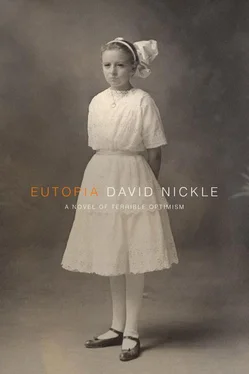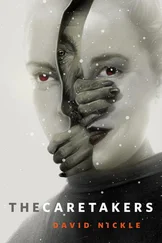§
They could not have been more than ten paces from the door when Ruth stopped, put a hand on Jason’s neck and touched his lips with hers. This kiss lasted longer than the other two, and when they parted, she sighed. “I think that I’m no longer afraid,” she said. “Of kissing, that is. Are you still frightened of the quarantine?”
Jason was, but he didn’t say so. Ruth laid her palm on his chest and looked up at him. The moon was past full, and low in the sky, and it filtered into a silvered filigree through the branches and leaves of the apple trees. She was smiling, mouth open. He couldn’t see her teeth.
“Your heart is thundering,” she said. “You are still afraid.”
Jason lifted her hand from his chest and stepped back. He was afraid. But it was not the quarantine that made him so.
It was that vision of Ruth Harper, small as a doll, mouth filled with sharp teeth and eyes black and mischievous. It was a mad fear; he knew that, but it was a true one—like she was some terrible Gorgon. He could not keep looking at her, but he couldn’t look away.
“May I help, Jason?” She closed the distance and took his hand. “Think of the first time we met. Do you remember? On the train?”
“Sure,” he said. “Although we didn’t meet on the train. It was after.”
“That is when we spoke. We saw each other some time before. I’ve been thinking on that, all this long evening. It was remarkable, don’t you think? That the two of us should, amid all those other passengers, lock our gazes across a rail platform?”
“I didn’t know our gazes locked,” said Jason, and Ruth laughed.
Jason swallowed. Ruth took his hand, opened the fingers and placed it against her cheek. Jason found her birthmark with his thumb, ran his finger along it. She lifted her chin and moved it so she nuzzled his hand, and that was all it took: the panic that had run up and down his back gave way to something finer.
“And here we are,” she said, “mere days later, off on a grand adventure—at one another’s side.”
“That’s something,” agreed Jason.
“Something,” she murmured. “Hmmph. I will tell you what it is, Jason Thistledown. It is fate.”
She peeled Jason’s fingers from her cheek. “Fate,” she said, “has seen us this far. It helped me overcome my terror at your touch. It helped us, through the good fortune of that mystery in your aunt’s bag, it distracted Louise from our adventure so we might have a few hours alone before you must leave. Now, let it help you.” She intertwined her fingers with his, and twisted so they were alongside each other.
“Come,” she said, leading the way along a path. “I know a way past father’s guard. Let’s be on our way.”
They headed into the orchard, along a row and then they turned and went along another, and it wasn’t long before he was entirely turned around and lost. He hoped that Ruth was not trusting entirely to fate to see them through the orchard and had some idea where they were going. Jason had read enough of the Bulfinch’s to know that not all fate was the helpful kind.
Before he could worry too much about that, they stepped out from the trees and back into moonlight. There was a rail fence in front of them, and past that, a gentle slope leading down to some back gardens, and then to a row of what Jason pegged for worker houses.
Ruth set the lantern on the ground and hoisted herself up on the fence so that she straddled it. Jason followed her over.
They headed down a footpath between beds of vegetables. Jason moved low to the ground and Ruth copied him, and kept up with him when he sprinted for the road. It was only there that Jason took a good look down the slope to the town, and noticed the lights.
Ruth stopped short beside him, huffing and clutching her lantern. “Oh my,” she said. “That is queer.”
They had a good view of the main streets of the town, and those streets were easy to tell, because they were lit up with lamps, bright like star-points, swinging and twinkling up and down the avenues. More light came from windows, shining squares of light that flickered with flame and intersecting shadows. That was strange—all those lights and activity past three in the morning—but that wasn’t what made him worry so.
It was the whistling.
The whistling was everywhere—and it was the same kind of sound as he had heard that first night, that filled the whole of the quarantine and got into the back of his head. The same as came up at the picnic, when Bergstrom made such a scene.
As he listened now, Jason wondered if maybe he’d been hearing it all through the night, since he snuck out from the house and made his way down here—got to wondering if maybe it had granted Louise the fascination with the love letters from Africa and Ruth her sense that fate decided everything. It was the sound, after all, that had nearly robbed him of his will, when he saw the thing—the Juke, whatever it was—in the quarantine.
And then, as fast as it had come, the whistling faded. And there were just the lights. Hundreds of lights.
Another light appeared beside him, as Ruth struck a match and held it to the wick of the lantern she carried. “I don’t know what they’re doing. But we won’t be able to sneak past them. We may as well hide in plain sight.”
Jason sighed. He slid the hatchet into his belt, and lifted his shirt so it covered the blade. He wished that fate, if it were watching over them, would have at least seen fit to provide him with a decent gun.
§
The street was empty, but it was lit by the flickering lamps in the windows and on the porches of the worker houses. Jason started, as he saw one of those lights blacked out for a moment—blacked out by something that was moving in the dark outside. Ruth didn’t notice that; she was too busy trying to hide in plain sight, as she’d said. She held the lantern in front of her like a banner in some parade.
“Jason,” she said, as they approached St. Cyprian’s, “I should thank you for your kind reply to my letter.”
“You’re very welcome.”
“And you answered many of my questions. But not everything.”
She stopped at the path to the church. “I can remember very specifically in fact, a particular question I put to you that you did not answer.”
“That so?”
“That’s so, yes. I asked you: why did you think that this fellow was sent to murder Dr. Waggoner? And you wrote me back a fine letter about many things besides that.” She lifted the lantern to shine it on Jason’s face, and peered into his eyes seriously. “Don’t think you can avoid all my questions, Mr. Thistledown, now that we have become intimates .”
Jason looked back at her. He was on the edge of telling her the whole thing: how Sam Green had warned him of the attempt on Waggoner’s life, and how Dr. Nils Bergstrom was tied up in it, and everything else. It would be easier to betray Sam Green to Garrison Harper’s daughter, he thought, than it would have to tell Aunt Germaine the truth about what had happened in the quarantine. Jason wondered about that: this was a betrayal, pure and simple—not just keeping a secret from someone he’d stopped trusting anyhow.
But it was betrayal to Ruth Harper, who was, as she’d put it, an intimate .
“Well, Jason?”
“I can’t,” he said. “I’m sorry but I can’t.”
She narrowed her eyes and looked at him more closely. Jason was sure then that she would become angry and stalk off, leaving him alone in the road. But she surprised him.
“I see that’s so,” she said. “I’ll not press the point. You can tell me about that when you tell me more about your papa.”
“All right,” said Jason.
Читать дальше









![David Jagusson - Fesselspiele mit Meister David [Hardcore BDSM]](/books/486693/david-jagusson-fesselspiele-mit-meister-david-har-thumb.webp)


